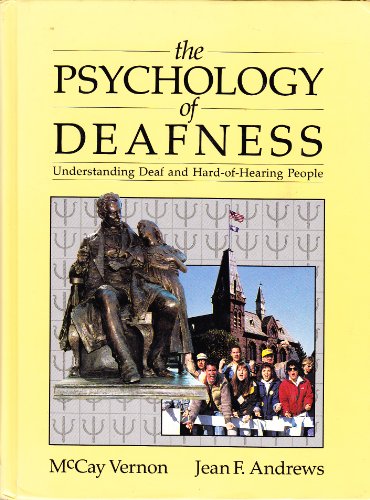 By Jean F. Andrews
By Jean F. Andrews
It was the end of August 1974, and I was sitting in a crowded classroom next to 25 other students at Western Maryland College (now McDaniel’s College) in the bottom basement of the campus library. The professor, dressed casually in a light blue guayabera, walked into the classroom, picked up a piece of chalk, and wrote down a list of the variables that make up a psychology of deafness. His lecture style was intense. However, his southern accent relaxed the serious tone. I looked down and flipped over my textbook, They Grow In Silence, and noticed the author’s picture. It was the professor standing in front of me. The only other authors I knew were dead, like William Shakespeare, Geoffrey Chaucer, and W.B. Yeats. I had graduated from an English department the year before, and now I was in a graduate program in Deaf Education. I had wanted to be an English teacher, but it was 1974, and the teaching jobs in regular education were taken up by young men dodging the Viet Nam draft. I had taken an ASL class in my senior year of college and thought that teaching deaf children through sign language would make for an interesting career.
I looked around the room and saw 10 to 12 of the students who were deaf and that a sign language interpreter was translating the professor’s lecture. Mac signed fluently and signed when students asked him questions. He frequently asked the deaf students to share their frustrating and lonely experiences growing up deaf. He talked a lot about his wife, Edith Vernon’s experience growing up deaf as well. Magically, Mac transformed the classroom into a platform for stories about the experiences of deaf people—the most unusual that I had ever heard or read about. His papers, available to us in the library, on the Role of Deaf Teachers and understanding the Group Minority Dynamics of Deaf Culture were exciting to read. Mac weaved Deaf Rights into the Civil Rights and Women’s Rights movements way before ADA and IDEA made their impact.
That year, Mac turned me and several of my classmates into published writers, movie stars, and scholars. He published our papers in the American Annals of the Deaf. He cast us in documentaries he was making about deafness. When we stopped by his office, he had a list of graduate programs at a variety of universities where he encouraged many of us to further our education and to get our Doctorates. Many of us in that classroom and in other classes taught by Mac did just that. We went on to be college professors, researchers, CEOs of technology companies, psychologists, social workers, deaf-blind specialists, forensic specialists, mental health professionals, writers, and administrators at schools for the deaf.
Mac’s gentle and consistent support was always only a phone call, a letter, or an email away.
“A man’s reach should exceed his grasp,” said the poet Robert Browning. And Mac’s reach extended beyond his grasp of the time we students spent with him in that crowded classroom 39 years ago.
Mac’s reach extended beyond us college students too. His research, writings, speeches, and advocacy have resulted in better lives for generations of Deaf people.
And we all lost a dear friend and colleague whose humor, humanity, humility, and vitality we will never forget.
Jean F. Andrews is a Reading Specialist and Professor Emerita of Deaf Studies/Deaf Education at Lamar University.
Related articles
- More on the Passing of Dr. McCay Vernon (deafinprison.wordpress.com)
- How To Learn About Deaf Culture? Read Tom Holcomb’s Introduction to American Deaf Culture (deafinprison.wordpress.com)
- Smash: What it’s like to be a deaf kid at school (limpingchicken.com)
- A Brief Discussion on C.I. Debate with Jean F. Andrews (deafinprison.wordpress.com)
- The Deaf community and WEA (weayorkshireandhumbertutorblog.wordpress.com)
- Dr Graham Williams: Who were the world’s greatest deaf scientists? (limpingchicken.com)
- Orkney Can Wait (lifeinlincs.wordpress.com)
- Donna Williams: Why everyone should give Big Brother winner Sam Evans a break (limpingchicken.com)


anotherboomerblog
bitcodavid
Pingback: Celebrating McCay Vernon and Visiting Felix | deafinprison
Pingback: September at DeafInPrison.com | deafinprison
Pingback: I Meet McCay Vernon | deafinprison
Pingback: Reading and Deaf Researchers | deafinprison
Pingback: A Basic First-aid Class for Deaf Adults | deafinprison
Pingback: 3-D printing in hearing aid technology | deafinprison
Pingback: Happy Thanksgiving and Thank You for Reading Us | deafinprison
Pingback: Felix Featured in Al Jazeera Documentary | deafinprison
Pingback: My 12 Favorite Posts of 2013 | deafinprison